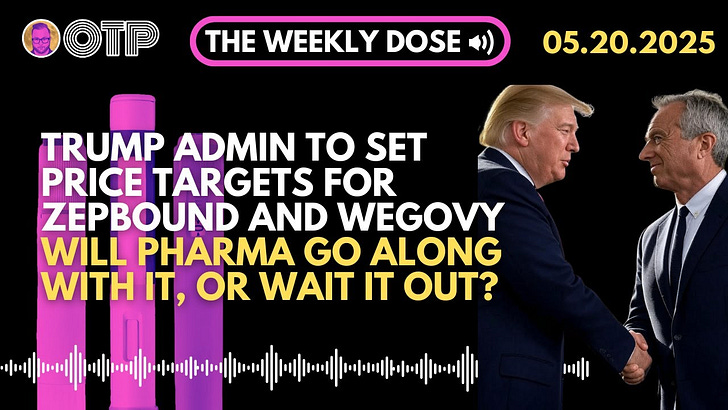The Weekly Dose 5/20/25
This week, mass compounding closed for tirzepatide, EMR's emerged as a new GLP-1 gatekeeper, and the Trump administration set sights on benchmark drug pricing.
On The Pen
May 20, 2025
We covered a ton of news this past week...
This past weekend, On The Pen broke the news that Tebra, a leading electronic medical record company, started sending out warnings to prescribers. If you write scripts for compounded GLP-1s, you could lose access to both your EMR and payment processing. The alleged muscle behind the move? Stripe. The payment giant that runs behind the scenes for most of these platforms is suddenly deciding what kind of medicine your doctor can provide. Regulators were not the ones putting on the squeeze, it was tech companies. Doctors got letters, patients got blindsided. On The Pen got it first.
The playbook looks familiar to anyone who has followed the cannabis industry. When banks and payment processors refuse to play ball, the whole sector moves to cash and care gets even harder to access. Now it is the compounding doctors and patients in the crosshairs, not just cannabis dispensaries.
Meanwhile, a federal judge in Texas handed the FDA a win and basically ended mass compounding for tirzepatide. Pittman’s decision said the agency was following the rules and did not need to listen to public comment or account for the patient demand behind compounded drugs. It was a straight read of the law and it gave Eli Lilly everything it wanted. Compounders are moving to custom microdosing under the 503A rules, but it is clear the window is closing.
And now, policy watchers have something new to chew on. The Trump administration is set to announce the first Most Favored Nation price benchmarks for drugs that do not have any generics or biosimilars. The goal is to peg prices in the US to the lowest price paid by any other wealthy nation, with the administration using both executive power and the Medicare negotiating framework set up by the Inflation Reduction Act. Unlike the last time this idea surfaced, the White House is now looking to back it up with enforceable targets and actual teeth. And if you missed today’s headlines, pharma lobbyists are already on high alert.
You would expect this to send shockwaves through the industry. But Eli Lilly’s CFO Lucas Montarce brushed it off at an investor conference, calling the executive order just another stick—something meant to prod pharma, not something to worry about. And yet, as Congress inches toward making this kind of policy law, with Democrats and Republicans suddenly rowing in the same direction, the risk to pharma’s business model is more real than anyone in the C suite wants to admit.
The bottom line for patients is not complicated. The days of mass compounding are winding down. Payment processors and EMR’s just became a new gatekeeper to care, with nobody regulating their power. And real federal drug pricing reform is closer than it has been in decades, with actual pricing benchmarks set to hit the market for high cost brand name drugs.
Stay alert, because this week was a turning point, and you heard it here first.
🎧 Download the Podcast Here
📬 Subscribe on Substack
💵 Venmo: @OnThePen
🏥 Get Obesity Care





Yes!
I’m hopeful 🤞🏼🤞🏼that this will “stick” in more ways than one 😉.